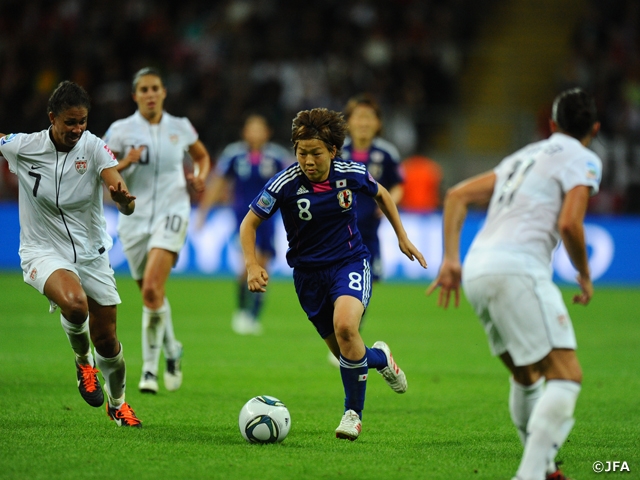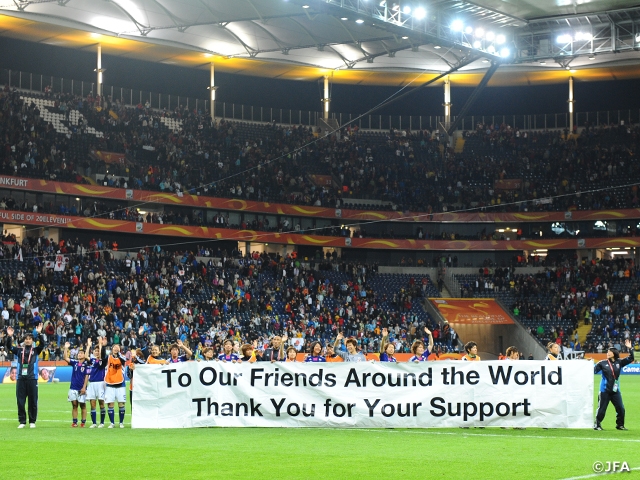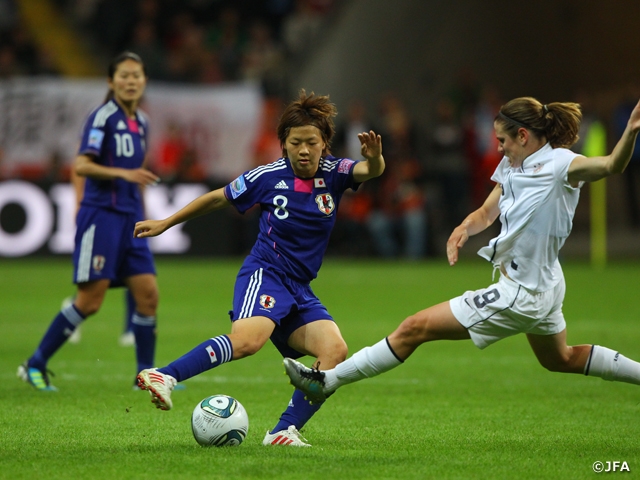NEWS
“My mind was occupied with thoughts on how I can help as a Japanese citizen” 10 years since the Great East Japan Earthquake – Relay Column Vol.2
15 March 2021

It has been 10 years since the Great East Japan Earthquake. While the restoration has progressed with a ton of support from home and abroad, there is still a long way to go for a full recovery. Here we will deliver essays and columns of people involved in football, reflecting on their own experience and perspective on the Great East Japan Earthquake.
For our second column, Ms. MIYAMA Aya, who played an integral role in the Nadeshiko Japan’s championship campaign at the FIFA Women's World Cup 2011™ in Germany, will share her experience during and after the earthquake.
The earthquake happened while I was on my flight from Haneda Airport to Okayama Airport. As soon as we landed, there were so many notifications on my cell phone, so I quickly went to my car to check the news, where I learned about the tsunami warnings. My family lives in Chiba, so I called them to make sure they were okay, but I wasn’t able to reach them at the time. Both Haneda and Narita Airport were shut down, so I had no choice but to head to my club (Okayama Yunogo Belle). It took me until night-time to reach my family and confirm their safety. There were other players from eastern Japan on my team, so I remember the training session was cut short and everyone was fluttering around nervously.
We continued to train on the following days, but we were all anxious about what we saw and heard on TV every day. I couldn’t think much about the Women’s World Cup or football, as my mind was occupied with thoughts on what I can do to help as a Japanese citizen. When we heard that electricity could be supplied from western Japan to eastern Japan, we asked our sponsors to help us train during the daytime, so that we could stop using the floodlights at our training facility. I also remember sending supplies to Nippon TV Beleza and JEF United Ichihara Chiba Ladies, who were deeply affected by the earthquake.
My motivation towards football kicked-in when I learned about the national team training camp (held at USA in May). Although I had been in contact with everyone on the national team, we hardly met each other during that time, so I was worried how it was going to work out. We started by facing each other, talking about our families, and took gradual steps through our daily conversations and training sessions to rebuild our bond. It wasn’t like we meshed as soon as we got together, nor did we see anything special in ourselves at that moment, but now that I think about it, something must have clicked to trigger a special force.

“Something I started for myself became something that helped others”
After arriving in Germany, we felt like we couldn’t go home empty handed because of how we got there. It wasn’t like I had extra room in my mind to care about anything other than my team, but at that time, I entered each match thinking that “there are Japanese people who are having a hard time.” After each match, we were given the opportunity to put up a banner that said, “Thank you for your support,” and I was just happy to be there and hoped that people in Japan can watch us from home.

I still don’t think that we were “giving courage to Japan.” With the support of everyone, we were given the opportunity to play football to the fullest, and the result just came with it. I was told that messages were arriving from Japan, and that’s when I learned that people were watching us. When I realised that people were greeting us with “Thank you” rather than “Congratulations,” I was struck with an emotion I had never felt before. Although it was something I started for myself, it became something that helped others, and that really made me want to continue with what I do.
On the following year, the USA Women’s National Team came for an international friendly match in Sendai, where they held football clinics and paid visits to the affected areas. I remember being told by the people of Sendai, “Thank you for bringing people we would never have met otherwise.” Surely, if we hadn’t won the Women’s World Cup, the USA Women’s National Team wouldn’t have come to Japan, and those young girls in Sendai wouldn’t have the opportunity to see them in person. From my perspective, I was just thinking that we were getting the opportunity to face USA in Japan, but I learned that it looked totally different from other people’s perspective.
“I don't want to forget what people have done after the disaster”
I don't want to forget what people have done after the disaster, rather than the disaster itself. Nobody was buying up all the supplies and people waited patiently in line. Despite their own struggles, people had the decency to care about others. I think that is one of the greatest virtues of this country, and we must always remember that we are capable of surviving through any adversity.

Latest News
-
National Teams
2024/04/17
【Match Report】U-23 Japan National Team win first group-stage match despite playing with 10 men following first-half sent-off - AFC U23 Asian Cup Qatar 2024™

-
National Teams
2024/04/12
U-17 Japan Women's National Team squad & schedule - AFC U17 Women's Asian Cup™ Indonesia 2024 (4/27~@Chiba, 4/29~@Thailand, 5/3~@Indonesia)

-
Referees
2024/04/05
YAMASHITA Yoshimi, TESHIROGI Naomi, and BOZONO Makoto named to officiate matches in the Games of the XXXIII Olympiad (Paris 2024)

-
National Teams
2024/04/04
U-23 Japan National Team squad & schedule - AFC U23 Asian Cup Qatar 2024™ (4/6-5/4@Doha, Qatar)

-
National Teams
2024/03/30
Regarding the decision of the FIFA Disciplinary Committee - FIFA World Cup 26™ / AFC Asian Cup Saudi Arabia 2027™ Preliminary Joint Qualification Round 2 vs DPR Korea (3/26@Pyongyang)



